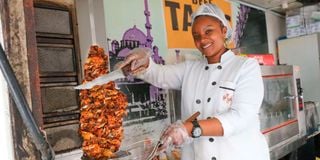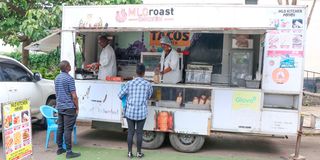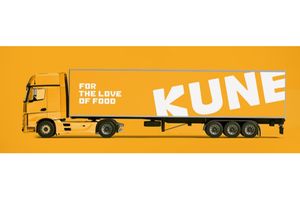
Rosemary Wacuka, the proprietor of the Mlo Mobile Kitchen in Nakuru City displays Shawarma at one of her mobile kitchens.
As food trucks gain popularity around the globe, they are redefining dining by offering diverse and gourmet experiences on the street. These mobile kitchens make gourmet cuisine accessible at affordable prices, nourishing communities and fostering a culinary movement that celebrates creativity, diversity, and the pleasure of eating on the go.
Nakuru has a vibrant food culture that reflects its diverse community and rich agricultural resources. The town offers many dining options, from local eateries serving traditional Kenyan dishes to modern cafes serving international cuisine.
Against this backdrop of diversity, entrepreneurship has emerged as a viable path to financial independence, particularly in the food industry, which attracts consumers with its wide range of options.
Mlo Kitchen, Nakuru's first food truck, exemplifies this innovation by bringing a taste of global cuisine to the city. Located in the bustling Central Business District, it redefines the conventional food truck model.
Founded by innovative businesswoman Rosemary Wacuka, the idea was born out of the challenges posed by the Covid-19 pandemic.
Ms Wacuka, a graduate of Egerton University with a degree in Education, began her career with the Taita Taveta County Government. But after losing her job during the pandemic, she was forced to innovate and explore new opportunities.
"After losing my job, I had to reassess my career path and [set out] to establish a business that would generate income and bring joy and inspiration to the community," she said.
Food and travel
Her passion for food and travel has deeply influenced her business identity. Together with her husband, their travels to various countries have broadened their culinary horizons and sparked the idea of bringing global culinary experiences to their community.

John Gichuru, a chief chef at Mlo Mobile Kitchen in Nakuru City prepares a meal
This vision culminated in the creation of Mlo Kitchen, a food truck business featuring authentic Turkish shawarma, a dish they perfected during their travels. They launched Mlo Kitchen with a start-up capital of over Sh1.5 million, accumulated over time from their savings.
Mlo Kitchen operates two food trucks in the CBD, a strategic approach that allows them to offer a variety of diverse, affordable and sustainable dining options. Their flagship dish, shawarma, has developed a loyal following among customers.
During a memorable trip to Istanbul, Turkey, she and her husband discovered the vibrant street food culture that thrives in the bustling markets and alleyways. They were captivated by the aroma of spices and the sight of chefs skilfully preparing shawarma. Initially unfamiliar with shawarma preparation, but inspired by the authenticity and flavours, she dedicated herself to perfecting the dish, ensuring it captured the essence of her travels. She returned ready to bring this exciting new offering to Nakuru.
As the first food truck in the area, Mlo Kitchen has redefined the dining experience, creating not just meals, but memorable moments. Their long-term vision is to offer "a taste of the world" by incorporating various international cuisines into their offerings.
A defining characteristic of Mlo Kitchen is its commitment to sustainability. With lessons learned from the Young African Leadership Initiative (YALI), it emphasises the importance of aligning business practices with global sustainability goals.
The venture works with local farmers to ensure that their produce -- potatoes, vegetables and onions -- is fresh and of high quality. This commitment not only minimises their carbon footprint, but also strengthens the local economy in Nakuru. The company operates under the principles of traceability, which assures customers of the freshness and ethical sourcing of their food.
Through partnerships with organisations such as Slow Food International and Chef Alliance, Mlo Kitchen ensures consistent quality and taste. Their focus on organic, locally sourced ingredients aligns with their mission to provide exceptional dining experiences without compromising sustainability.

Rosemary Wacuka, the proprietor of the Mlo Mobile Kitchen and her chief-chef John Gichuru.
The trucks run on renewable energy from solar panels that power everything from the shawarma cooking to the refrigeration.
Mlo Kitchen currently employs four full-time staff and three casual workers. A key element of its success is an unwavering commitment to providing exceptional customer service.
“People buy feelings. The emphasis is not merely on food but on the overall experience, connection, and value. This customer-first philosophy has cultivated a loyal clientele,” she says.
The menu includes freshly made samosas and the popular hot dogs, combining carbohydrates, proteins and vegetables for a satisfying meal. The standout item, however, remains the shawarma, celebrated for its rich flavours and authentic preparation.
Online presence
Technology has had a significant impact on Mlo Kitchen's operations, particularly through social media marketing and online ordering systems. Using platforms such as Instagram and Facebook, the food truck showcases its menu items with enticing photos and engages customers through interactive posts.
This active online presence not only attracts new customers but also fosters a loyal community. In addition, Mlo Kitchen embraces online ordering, allowing customers to place orders in advance for added convenience and streamlining service during busy hours.
The team also uses resources such as YouTube to learn about different cuisines and refine their recipes to stay on top of global culinary trends. This integration of technology enhances the overall customer experience and positions Mlo Kitchen as a modern, customer-focused dining option in Nakuru.

Mlo Mobile Kitchen at Masaai Market in Nakuru City.
The road to establishing a food truck was not without its challenges. Securing the necessary licences from the county government was a major hurdle, requiring four months of advocacy to demonstrate the viability and safety of the food truck model.
“Another challenge has been consumer education, particularly in introducing international cuisine like shawarma. This required efforts to inform customers about the unique flavours, ingredients, and cultural significance of the dishes to enhance appreciation and interest in the local community,” she says.
Designing and building the food truck presented its own set of challenges. With no local benchmarks, Wacuka and her team relied on research and experimentation to perfect their setup.
“We aspire to offer flavours from New York, Ethiopia, and beyond. Our ultimate goal is to bring global culinary experiences to Kenya, one dish at a time,” she notes.
Looking ahead, she plans to sell franchises in other regions, allowing more communities to enjoy the diverse global flavours that Mlo Kitchen offers. As the business grows, she promises to introduce these international cuisines to a wider audience, fostering a deeper appreciation for culinary diversity while strengthening community ties through the joy of shared dining experiences.









